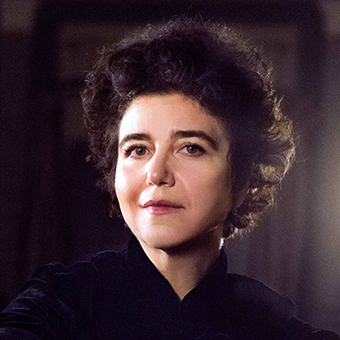
Lera Auerbach
Lera Auerbach was born in Chelyabinsk (Urals) on the edge of Siberia. At the age of twelve, she was already working on her first opera and also wrote a number of poems. At the age of 17 years, during a concert tour in the USA, she decided to move to New York as a virtuoso pianist. She then studied piano and composition at the Juilliard School. She also studied comparative literature at Columbia University. She then completed her concert exam at the Hanover University of Music and Drama in 2002 and gave her debut at Carnegie Hall on 1 May 2002, where she performed her own Suite for violin, piano and string orchestra op. 60 together with Gidon Kremer and the Kremerata Baltica. Since then, the worldwide career of the composer, pianist, visual artist and poet has been unstoppable. As a pianist, she has performed in the most prominent concert halls such as New York's Carnegie Hall, Lincoln Center, Munich's Herkulessaal, the Oslo Concert Hall and the Kennedy Centre in Washington. Today, her extensive catalogue of works covers all genres, from piano and chamber music to orchestral works, opera and ballet, and is performed by leading soloists, orchestras and theatres worldwide.
Lera Auerbach's music reflects an undogmatic relationship to the avant-garde and is strongly indebted to traditional influences. For her, there is no contradiction in using tonality and classical formal language to find new paths. The composer has a whole cosmos of unfamiliar sounds, colours and procedures at her disposal, which in many respects characterises a personal style that has matured over many years.
Her ballet music for the legendary choreographer John Neumeier - including the ballet The Little Mermaid, which was created in 2005 for the 200th birthday of the poet Hans-Christian Andersen - has travelled the world. The recording of The Little Mermaid won an “ECHO Klassik” award for best music DVD. The ballet has also been honoured with two “Golden Masks” and has been performed over 250 times worldwide. Many of her works are inspired by non-musical sources.
The choral cycles „72 Angels“ and „Goetia“, for example, deal with angels and demons and ancient mythology. In her symphonies, she constantly shifts and expands perspectives as she constantly scrutinises and breaks open the forms of what is possible and what constitutes a symphony. ‘The genre lives, transforms and redefines itself,’ says the composer." In my Symphony No. 2 “Requiem for a Poet”, Symphony No. 3 “The Infant Minstrel and His Peculiar Menagerie”, Symphony No. 4 “Arctica" and Symphony No. 6 "Vessels of Light” there is an orchestra, choir, vocal soloists and also instrumental soloists."
For some time now, Auerbach has also been appearing more and more frequently as a conductor. ‘Creating large-scale musical canvases on the podium,’ she says, ‘and sharing a vision of expression with the orchestra, drawing on my experience in various art forms and integrating these currents into the ocean of the orchestra and the stage, that is my greatest happiness.’
Auerbach is a true cosmopolitan, not only artistically, but also in terms of her frequent changes of residence. After starting a new life in the USA, where she was later granted American citizenship in recognition of her exceptional talent, she was also granted Austrian citizenship by the Austrian government in 2021 for her significant contribution to music and art.
Auerbach's literary publications include volumes of poetry and prose, novellas and numerous contributions to newspapers and magazines. The International Pushkin Society named Auerbach ‘Poet of the Year’. The volume ‘Excess of Being’, in which she explores the art of aphorism, was also published in English. In 2022, the children's book ‘A is for Oboe’ was published (Random House), which was honoured with the ‘AudioFile Best Audiobook Award’.
As a visual artist, Lera Auerbach has created sculptures that are linked in many ways to music, literature and her life. ‘There is no reason to leave something in its cage and not connect it,’ says Lera Auerbach. "For me, you have to feel in your art that it's bigger than life. Art, be it music, visual art or literature, is what remains of our time."
Lera Auerbach's musical works can be heard in over fifty releases on various labels such as ECM, DG, Nonesuch, Sony Classical, Alpha Classics and BIS.
Visit Lera Auerbach's website at www.leraauerbach.com
July 2025
This biography can be reproduced free of charge in concert programmes with the following credit: Reprinted by kind permission of Boosey & Hawkes | Sikorski.
